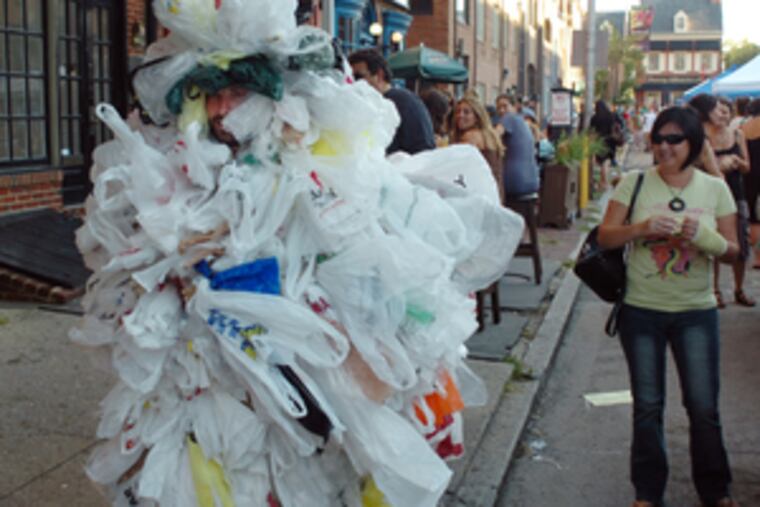
What Danielle Hudena modeled onstage at yesterday's Greenfest Philly fashion show resembled your basic black, off-the-shoulders dress. Only it was made from bamboo.
"Eco-fashion" proponents say that is the idea: making stylish clothes whose environmentally sustainable origins aren't obvious or unflattering.
"You're not sacrificing style and fashion," said Ali McCloud, owner of the Arcadia Boutique in Northern Liberties, which carries the dress Hudena modeled. "The days of thinking that eco-fashion is kind of crunchy and has to be a big, baggy brown shirt is a thing of the past."
Participants in the outdoor festival that promotes an environmentally sound lifestyle broadcast the message that doing so wasn't hard - whether living in an energy-efficient home, drinking water out of a reusable bottle, or wearing clothes of organic cotton.
The goal is "to connect people around environmental issues and make people realize it doesn't take a lot of money and effort to be green," codirector Sean Jacobs said.
The event, in its third year, drew what Jacobs estimated to be about 20,000 people to Second Street, from South to Pine Streets. Among the 200 exhibitors were money managers who could invest your money in environmentally sustainable stocks, developers who build energy-efficient homes, and home furnishers who offer "green" pillows and table mats. There was even valet parking for bicycles.
One company set to open an office in Philadelphia next year, Spring Water on Tap, which is backed by AT&T, made its debut with a system that dispensed local spring water. The system is equipped with special sensors and uses a 60-gallon tank that needs replacing only every five or so years, making it more efficient than commonly used five-gallon plastic water containers, director of marketing Vickye Bone said.
"There are some great ideas," attendee Arthur Auerbach of Philadelphia said. "This is educational. This is ecological. This is going to change people's lives."
Clothing marked a substantial part of the festival's offerings, both in the eco-fashion show, which showcased more than a dozen models in "green" getups, and on street vendors' tables.
"Our customer is a highly educated customer, is most of the time urban, is environmentally conscious," said Poonam Singhal, whose company's product lines were prominently featured in the show. "They seek us out."
Her company, Rupalee Exclusifs L.L.C., has trained a cooperative of women in India under fair-trade practices to hand-weave garments and use vegetable or low-chemical dyes. The company distributes the clothes to retailers in the United States and other countries.
Clothesline Organics, which opened two years ago in Bethlehem, had on display clothes made from organic cotton, or cotton grown without pesticides.
"When we opened, people stop in and say what is organic cotton . . . we don't get that question anymore," said owner Kim Schaffer. "It's more stylish than it was two or three years ago. It's things that you would wear and no one would ever know it."
Senior Ashley Christensen and her classmates at Philadelphia University went to gather information for the student environmental sustainability group started this year at their school, where she has already halted the use of trays in the dining hall.
One day, she said, "it's going to be not that you have to think to be sustainable," but it will just happen.